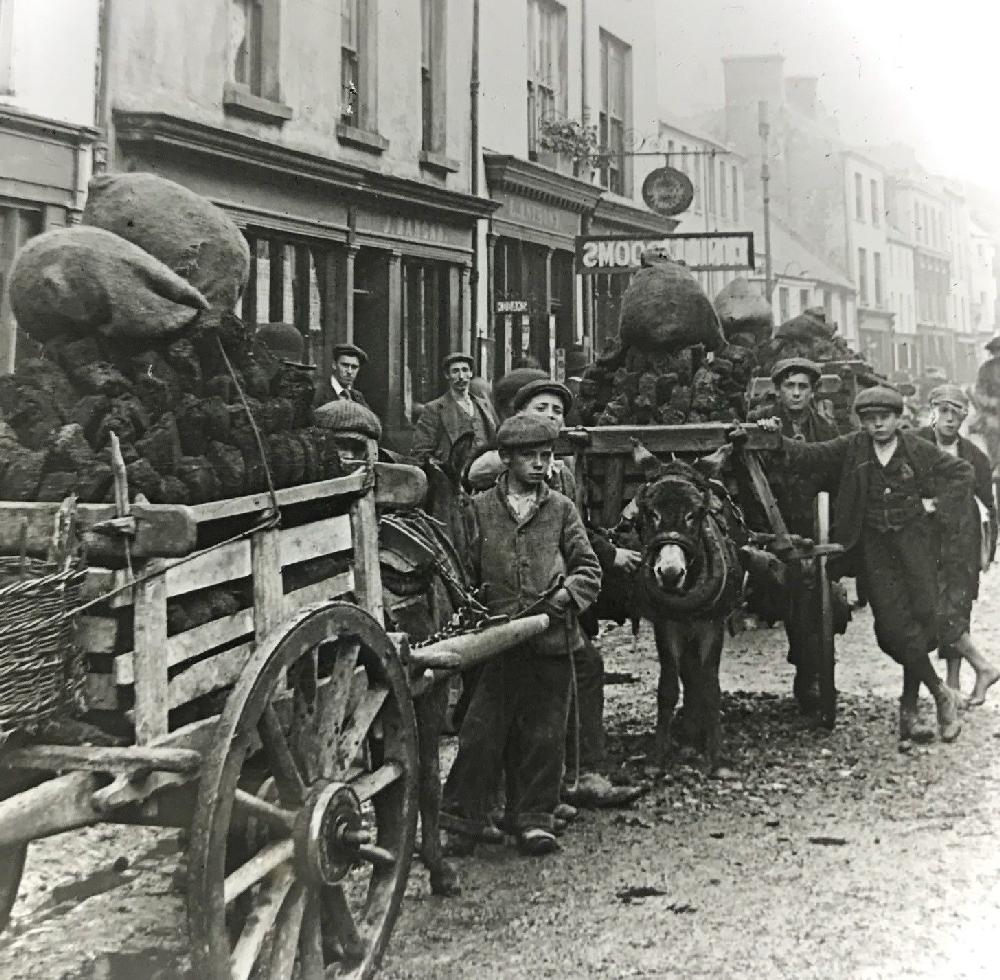
England and Ireland: Parliamentary Fight for Home Rule (1860s-1910s)

Figure 1.--Catholic southern Ireland was the poorest part of the United Kingdom. Ireland was controlled by the small Protestant minority, kept in power by a British garrison. Protestants often absentee lanbdlords owned almost all the land. Most of the population lived in rural areas and were involved in agriculture. Not only did they rceive the opriceeds from only part of the harvst, but agricultural methods were so backward. Peat was virtually the only natural resource. Here peat is being sold in Killarney for home heating. Home rule for Ireland was one of the major issues in British politics, but was put on hold with the outbreak of World War I. The Magic Latern oslide here is undated, but would have vneen taken about 1900.
|
|
Liberal William Gladstone became British prime minister (1868). He sought to solve the Irish Question through Home Rule. Solving the Irish Question was complicated by Protestant northern Ireland (Ulster) which objected to home rule as Ireland as a whole had a Catholic majority. Gladstone introduced the first Home Rule Bill in Parliament (1886). Gladstone Bill's bill, however, failed to pass the Commons. Even so, it had profound consequemnces in Ireland. Protestants mostly in the north began to worry about a future in which they would be dominated by a Catholic majority. There was a resulting outburst of what was called Orangeism meaning Protestant unionism. The Conservative opposition in Parliament made unionism and the preservation of the union of Great Britain and Ireland into a major and intense political issue. Gladstone decided to make a second attempt at home rule. He managed during a brief Liberal interegnum to introduce a second Home Rule Bill which was also defeated (1893). When the Liberals finally returned to power, Gladstone was gone, but the Party still supported the idea of home rule (1905). Arthur Griffith founded Sinn Fein (Ourselves Alone) (1905). The Liberals in tne Commons did not, however, manage to pass the Third Home Rule Bill until several years latter (1912). It was rejected twice by the House of Lords. A major impediment was a prominent barrister and member of Parliament -- Edward Carson, Baron Carson of Duncairn. He strenuously resisted the incorporation of Ulster into a majority Catholic self-governing Ireland. Protestant opposition was not meerly parlinentarian. Protestants swore oaths (the Solemn League and Covenant) and began to form and arm paramilitary militias. As the possibility of a home rule bill passing the Lords seemed a real possibility, civil war loomed in Ireland. It was not a conflict with Britain, but between the Irish nationalists in the south and unionists in the north. The Commons passed the Home Rule Bill of 1912 for the third time just before the outbreak of World war I (1914). And this meant, because of the closely fought Parliament Act of 1911 pushed through by Prime Minister H.H. Asquith that ratification by the House of Lords was not needed. Asquith was still working on Irish Home Rule when World War I erupted. Asquith decided to postpone the operation of the Home Rule Act until after the War because of the potentially explosive consequences. And Asquith hinted that some special provision would be made for Ulster.
CIH

Navigate the Children in History Website:
[Return to Main IrishHome Rule page]
[Return to Main Irish-English history page]
[Return to Main Irish history page]
[Return to Main 20th century war page]
[About Us]
[Introduction]
[Animals]
[Biographies]
[Chronology]
[Climatology]
[Clothing]
[Disease and Health]
[Economics]
[Ethnicity]
[Geography]
[History]
[Human Nature]
[Law]
[Nationalism]
[Presidents]
[Religion]
[Royalty]
[Science]
[Social Class]
[Bibliographies]
[Contributions]
[FAQs]
[Glossaries]
[Images]
[Links]
[Registration]
[Tools]
[Children in History Home]
Created: 12:45 AM 12/24/2018
Last updated: 12:45 AM 12/24/2018



